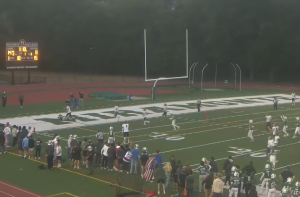Miramonte Implements New Racial Equity Classes
September 14, 2020
A quick scan of the headlines in 2020 might indicate that racial justice is a nation-wide movement, conducted on a large scale. In the past few months, incidents documented on social media have shown the Lamorinda community that it is far from immune to the nation’s problems. But, while social justice can mean protesting in the streets or writing to your local congressman, it can also start on a much smaller level. It can start by recognizing racism in your community, and most importantly, it can start in the classroom. This year, students saw two new classes in the Miramonte course catalog with a twist: racial equity.
For seniors, Miramonte offers Steve Poling’s “Deconstructing Race”, where students read books centered around the issue of equity and race. “This class was inspired by my own journey to learn more about race and racism- tons of reading and discussion over many years of teaching,” Poling said. “I’m hoping seniors will learn about how race and racism impact all of us psychologically, sociologically, and politically. Students will learn some history they may not have learned before.” Poling worked in collaboration with other teachers in the district to create the class, which earned UC approval over the summer, and is now offered in three out of the four AUHSD schools. The book list includes many current best sellers such as Ta-Nehisi Coates’s Between the World and Me, Robin Diangelo’s White Fragility: Why It’s So Hard for White People to Talk About Racism, and Beverly Daniel Tatum’s Why Are All the Black Kids Sitting Together in the Cafeteria. But in “Deconstructing Race,” the most important learning doesn’t come from books. “Everyone plays a role in perpetuating systemic racism and I want to figure out how I can take action that is actively anti-racist- self introspection is a fundamental starting point in the fight to build a more just society,” senior Tahra Panah said. The students aren’t the only ones learning in this class. “I too will learn a great deal from listening to the students- there is still so much I do not know,” Poling said.
“Deconstructing Race” enters the AUHSD curriculum at a critical juncture. In wake of the current protests, the class wound up being even more important. “This class is extremely relevant to today’s climate. Americans’ resistance to racism and police brutality fills social media and the streets, making us face a period of reevaluation,” Panah said. California is set to be the first state to require that all high school students to pass a one-semester ethnic studies course to satisfy an English or social studies requirement for graduation. As the details of the proposal undergo revision, the state’s largest school district, Los Angeles Unified, already chose to adopt the ethnic studies graduation requirement for the 2023-24 school year. “I would like to see our district add a graduation requirement for a course in Racial and Social Justice- there is so much to learn,” Poling said. As for an ethnic studies class, the Miramonte course catalog did offer the course this year. However, the school did not end up running the class because not enough students signed up to take it. “Next year, one of our goals is to better advertise this course and really recruit students to sign up so that we can offer a class,” Principal Julie Parks said.
Although Miramonte does not offer Ethnic Studies this year, it does offer a special new class for equity leadership. Unlike “Deconstructing Race”, which is offered in multiple AUHSD schools, this class is Miramonte specific. Led by Kristen Plant, the course specifically tackles racism within the Miramonte community. “The goal is, this year, to have a trial program where we make the space for student leaders committed to equity work and staff members who can come join our class to have protected time and space to focus on taking our antiracist and equity work at Miramonte to the next level.” Plant said. Students across all grade levels elected to take the course. “I decided to join the class because I realized that if I wanted to see the necessary change at Miramonte, I would have to be a part of that change. I can’t just sit here and do nothing and expect an anti-racist school community,” junior Gracia Chen said. In the fight for racial equity, Miramonte puts its students’ voices first. As equity leaders, students in the class get to build the course alongside the staff. “Students are the ones designing the curriculum and we are the ones who get to decide what we want to do. So far, we have pitched ideas to the staff about how to improve Monday Cohorts,” Chen said.
These new classes are just the beginning. They are the first step forward in creating a more equitable classroom, and a more equitable community. But, as Americans imagine a world where protests against racism are no longer necessary, it is not hard to also think of a time when racial equity classes are not a novelty. “It’s important to have specific classes designed and committed to this, and for me, I want that to also be happening across the curriculum,” Plant said. “I’m dreaming of a world where someday, ethnic studies are so embedded in everything we do at school, that we don’t need a separate ethnic studies class because our curriculum has finally gotten to a point where it is equitable.”







